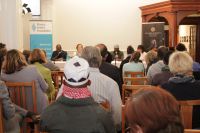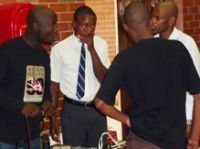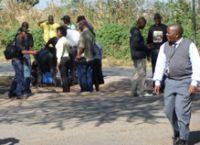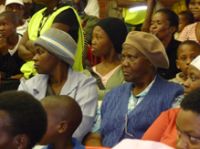Sept 3, 2008 – “Next year when the Nelson Mandela Foundation returns, I don’t want people to be putting down stones that represent me.” This powerful reflection came out of the “counting your losses” session at a township dialogue, where participants laid down small stones to represent the lives of loved ones lost through AIDS
On July 11, 2008 the Nelson Mandela Foundation’s community conversations series came to KwaMakhutha, south of Durban in KwaZulu-Natal. This HIV prevention dialogue was a follow-up to one held in the same township in November 2007, when the community’s youth identified some of their concerns as: lack of communication (because of cultural conservatism), alcohol abuse, myths about an AIDS “cure”, abuse of women and children, and the exchange of sexual favours for money.
About KwaMakhutha
Over the years KwaMakhutha was torn apart by violent conflict between the African National Congress (ANC), the Inkatha Freedom Party (IFP) and the apartheid-sponsored security forces (the South African police and defence force).
In the province of KwaZulu-Natal, at least 14 000 people were killed in fighting between the IFP and ANC from the mid-1980s on. Ordinary people experienced massacres, too, at the hands of the forces that were supposed to protect them.
The community of KwaMakhutha has experienced a great deal of pain over the years. In May 1996, when no agreement had been reached between the ruling party and the IFP, this increased tensions, leading to the possibility of elections not being held.
At that time, President Nelson Mandela called a meeting with King Goodwill Zwelithini, IFP leader Mangosuthu Buthelezi, ANC KwaZulu-Natal leader Jacob Zuma and traditional leaders in the province. Dialogue brought about a resolution, and peace and stability were restored in the province.
But political tension is not the only problem the area has faced. HIV infection is still on the rise in KwaMakhutha and most of those getting infected are young people, according to Sister Moganye at KwaMakhutha Clinic. She says the infection rate has increased since last year. There is a pressing need for behaviour change.
Ward Councillor Zithulele Ntuli says that “if one takes a drive around the township at 2am, one always finds crowds of people walking around from taverns as you would see children leaving the school premises after school”.
Social mobilisation
The team which runs the community conversations goes to the community well in advance of the event to mobilise people to attend and engage the support of local structures. Their goal for KwaMakhutha was to get at least 400 people together to focus on the issue of knowing your HIV status.
Beginning on July 15, the team followed the strategy that has been employed in other communities and described in the reports on this site.
Partnerships
The successful implementation of the community conversations programme continues to depend on effective partnerships between government, civil society and the private sector. In KwaMakhutha, the team engaged the following structures and organisations as partners in planning and carrying out the conversation:
- Office of the Mayor
- City Manager
- YMCA
- KwaMakhutha Clinic
- Napwa (National Association of People Living With HIV/AIDS)
- Coastal Hospice
- Youth Desk
- KwaMakhutha High School
- Umkhunisi High School
- Office of the Speaker
- Department of Health
- Department of Social Services
- Ward Councillors
- Masakhane High School
- Church of Christ, Dutch Reformed Church and Methodist Church
KwaMakhutha Local Municipality allocated an office space for the team to operate from and provided the venue at no cost. Ethekwini Municipality provided catering and three buses for the conversation.
Media intervention
Ahead of the event, the team was hosted by both Gagasi-FM and Durban Youth Radio, and spoke about community conversations for 15 minutes on each radio station. Live reads were done on both stations from August 4-7. Posters were placed at strategic points, including taxi ranks, shops, taverns, street poles at youth centres. Flyers were distributed at meetings, events and church ceremonies. There was also an article in a local newspaper, the South Coast Sun.
Conversation session and facilitation
About 950 community members attended the conversation at the Siphumelele Community hall in KwaMakhutha. Of these, 54% were youth (most of them female) and 46% were adults (most of them women). They came from KwaMakhutha, Ezimangweni, Ezimbokodweni and wards 93 and 96.
The facilitator, Nhlapo introduced the purpose and vision of the event, and referred to last year’s Youth in Dialogue session, reminding everyone that young people wanted their parents to be involved more in their efforts against HIV. He also highlighted the fact that KwaZulu-Natal participated in piloting the Community Capacity Enhancement methodology. Another facilitator Lesley Nkosi spoke about remembering those we have lost and fighting adversity together, which was a moving experience for the participants.
KwaMakhutha is a conservative community where there is a strong attachment to traditions. Most families are poor and there is a strong sub-culture of alcohol abuse. An environment like this tends to limit dialogue and it is imperative to create a safe space for communication where people will not feel victimised.
The team employed the same methods as in other community conversations, namely “counting your losses” and “storytelling”.
Some of the reflections expressed
- “When I had to put a stone down to remember those I’ve lost to HIV, I thought that all the family members I’ve lost are enough. Next year when the Nelson Mandela Foundation returns, I don’t want people to be putting down stones that represent me. It hurts deeply. Let’s fight hard to put a stop to this.” (Adult woman)
- “I am deeply touched by this experience. I know what it’s like to lose someone you love. When it happened in my family I was called by my father, who lived on the farm then. He was already dying and when he called me he was so sick he couldn’t even get up to relieve himself. I had to go to the clinic to ask for diapers to help me take care of him. When I returned home it wasn’t long before I had to get diapers for my mother too. I failed my grade 10 exams last year because I could not concentrate in class, worrying about coming back home to take care of my mother. I am asking myself: who will I take care of next? I was a bright student at school but I couldn’t pass. I am hurting a lot.” (Teenager)
- “When Mr Nkosi said that one stone represents one soul, I had to think about how many people I’ve lost. But when I came to the front, I did not know how many stones to lay down. So I had to pick only one stone, although I have seen many diminish in front of me. As I speak to you all now, I know 13 close friends and family who are bed-ridden. What hurts the most is that people are afraid to disclose. How many times have I been told to condomise and the very same day or hour, I would go ahead and have sex without a condom. I am afraid I could also end up HIV-positive.” (Adult man)
- “I come from a very large family and I have watched them over the years disappear because of HIV. I have been to the graveyard too many times and I want this thing to end now. We should not have to take care of our grandchildren because we can’t beat the disease. My son’s wife came to the elders a few years ago to say that she thought she should start using a condom with her husband because she thought my son was fooling around. As the elders we told her to remember her vows and if she abstained or used a condom, she would be defying her husband. Her husband died from AIDS and she soon followed. This must be stopped.” (Older man)
After these reflections, the facilitator created an atmosphere where the community could refer back to their past triumphs in the face of adversity. “We are proud of those who reflected. This disease should not triumph over the people of KwaMakhutha. Remember that fighting is not new to the nation of the Zulu. When did the fathers of KwaZulu give in and put their hands down as if they were defenceless? When did it become acceptable to hear the desperate cries of the Zulu mothers over their children without fighting back? How long shall we stand back and watch our children fade out in front of us without putting up a fight? It’s time to talk so that we can reach the end of this madness. It’s time to fight death and face it head on. This is a healing process.”
Storytelling
The facilitator outlined the beginnings of a story for the community to pick up on and expand – a method of expressing their values and concerns.
The story started like this: “In the community of KwaMakhutha, we meet two families who serve in the same church. The Sithebe family is blessed with a son named Siyabonga who is 25 and studying to become a doctor like his father. The Mkhize family is blessed with a daughter, 21, named Slindile, who is in her first year of studying to become a teacher. Slindile and Siyabonga are engaged to be married. After their engagement celebration party, Siya heads back to Polokwane, where he studies at Medunsa, while Sli helps with the cleaning at the home. When she leaves for home in the evening, she is met with a great misfortune. She is raped by local boys whom she knows. She goes to the police station to report the matter and is advised to go to the clinic at KwaMakhutha to get checked. She is tested and is told that she is HIV-positive.”
The participants at the conversation, grouped into men, women and youth, responded to the facilitator’s questions like this:
What would you do if you were Slindile?
Some responses from adult women
- I would tell my husband to go for counselling because he’s the one I’m facing the problem with.
- I would tell my pastor and ask for advice.
- I would go to the clinic to get information and accept my status.
- I would ask for advice from my mother.
- I would ask my family to meet with my husband’s family and talk. That’s where we would get the solutions.
Some responses from adult men
- Never give up, this life goes on. I would let my family know where I stand. I shouldn’t hide my status. I should consider people’s decisions when I tell them about my status. I would try and tell people about my status so they don’t treat me differently.
- I would chase her out of my house. That’s not how I’ve raised my daughter.
Some responses from the youth
- I would talk to Siya and my family and feel free. I would tell Siya to think about our marriage; he must wait and we could use protection.
- I would tell my husband so he can know. We can go back to the clinic because there are some treatments that can be taken. Life goes on and we will use a condom.
- I would start by doing some research on how I can survive, because there is something you can do when you are raped and you take pills within 72 hours. There is also a gel that you can apply when you do not use a condom. Those are some of the options I would find out about before I go to my husband, so when I talk to him I can bring some hope to our situation. He will know that he does not have to get HIV as well.
- I would first go to Siya and tell him so that we would go and seek help together. He would not like to hear what happened from other people, which would hurt him.
Issues raised
The community of KwaMakhutha brought up these issues as their strongest concerns:
- Disclosure
- Awareness building
- Information sharing
It was also acknowledged that poverty lies behind most of the temptations and challenges faced by young people. Substance abuse also puts them risk as they tend to be oblivious to messages about HIV/AIDS.
Challenges
Some of the practical challenges at the event were working with such a large number of participants, youth using humour to ease their discomfort when talking about HIV, and the reluctance of some older men to participate.
Action committee
The community nominated representatives who would form a working team to carry forward the plans decided on. A support task team was also selected, representing the KwaMakhutha Community Resource Centre, Napwa, the municipality, the ward council, the clinic and the Demographic Development Programme.
The team used the “five friends of planning” – what, how, who, where and when – to focus on what they had to do. This included building awareness of substance abuse as a cause for the spread of HIV, and getting in touch with more stakeholders, for example in the Health Department.
Images from the event
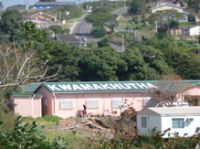
Images from the event
